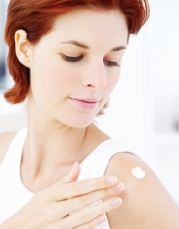Our skin says a lot about us. Whether we’re tired, stressed out or eating an unbalanced diet, our skin will tell the tales. Natural skincare and makeup companies are hard at work to ensure our outer layer is glowing and healthy with products that are more innovative than ever. Topical probiotics, plant stem cells and long-lasting mineral makeup are just some of the tools personal care specialists are using to help shoppers look—and feel—their best.
Protection with Probiotics
Probiotics have become some of the most successful digestive health ingredients in the functional foods and dietary supplement categories. Shoppers know them as a way to “stay regular” or as a standby after an antibiotic regimen. Some skincare companies are taking a cue from the success of probiotics in these markets, and are working helpful bugs into topical products.
Many industry insiders see topical probiotics as a natural fit for the category because they feed and nourish healthy beneficial bacteria that live on the skin. Helping maintain the proper balance is a chief concern of some skincare makers. “Mother Nature has provided a miraculously balanced ecosystem,” which is comprised of numerous microorganisms (including good and bad bacteria on the skin), says Hugo Saavedra, founder of Hugo Naturals, Chatsworth, CA. “Probiotics enhance our skin’s ‘good’ organisms to help protect us from those that may be more harmful.”
Muneaki Takahata, Ph.D., a microbiologist who works with fellow microbiologist, Iichiroh Ohhira, Ph.D., maker of Dr. Ohhira’s Probiotics (sold by Essential Formulas, Inc., Farmers Branch, TX), agrees, adding, “The two important factors for healthy skin are: (1) eating a balanced diet and (2) enhancing a barrier function on the surface of the skin by producing a proper balance of resident skin bacteria, which, in turn, provides a protective film for the skin. The function of this film is to protect the skin from external ‘bad’ bacteria and chemical agents.”
Topical probiotics may be quite unlike the food and supplement forms of probiotics, which are living lactic bacteria (LAB). Takahata speaks of the probiotics in Dr. Ohhira’s line: “A variety of plants, mushrooms, fruits and vegetables are fermented using 12 strains of LAB for three years. In Japan, we call the resulting fermented medium the ‘fermented extract.’” This extract contains pre- and probiotics as well as organic acids, bacteriocins, enzymes and vitamin, mineral and amino acids by-products. While live bacteria are present in the extract, heat used during its blending with other natural ingredients kills the LAB.
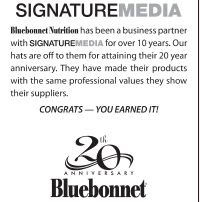 Destroying the LAB would mean the end of a successful probiotic supplement, but skincare products work quite differently. Says Takahata, “As research from the University of California/San Diego (in cooperation with an Israel counterpart university) has established, dead carcasses of LAB are beneficial to the human body.” Bacteria in this state, he feels, can even benefit the skin’s immune system and serve as a moisturizer. “Remember, the ‘fermented extract’ is blended with many other soothing and beneficial natural ingredients, such as aloe,” says Takahata.
Destroying the LAB would mean the end of a successful probiotic supplement, but skincare products work quite differently. Says Takahata, “As research from the University of California/San Diego (in cooperation with an Israel counterpart university) has established, dead carcasses of LAB are beneficial to the human body.” Bacteria in this state, he feels, can even benefit the skin’s immune system and serve as a moisturizer. “Remember, the ‘fermented extract’ is blended with many other soothing and beneficial natural ingredients, such as aloe,” says Takahata.
Given that the good–bad interaction of bacteria takes place on the skin’s surface, deep penetration of topical probiotics is not a huge concern. “In most cases, these probiotic ingredients should not need to be absorbed too deeply into the stratum corneum, but instead remain on the upper layer of the epidermis,” Saavedra notes.
Nonetheless, other components within a topical probiotic formula may absorb into the skin well. Says Jodi Billet of Earthly Elements (a Solgar brand) about her firm’s personal care line (which includes pre/probiotics in its body lotions), “These body lotions absorb very well and stay on all day to keep skin hydrated.”
|
Select Natural Skincare and Makeup Products
Brigit True Organics: Organic olive-oil based body care including moisturizers and creams, healing balm, lip balm and Castile soaps. Sun care and specialty lines for derma e Natural Bodycare: Full line of natural skincare products including Skin Lighten, Topical Solutions products, Pycnogenol Redness Reducing Serum and more. Earthly Elements (a Solgar Brand): Personal care line that includes body lotion, body wash and hair care. Essential Formulas, Inc.: Dr. Ohhira’s Probiotic Kampuku Beauty Bar, Dr. Ohhira's Probiotic Magoroku Skin Lotion. Emani Minerals: Three types of foundations for all-day wear that include pressed, crushed and liquid mineral foundations. Hugo Naturals: All-natural vegan, gluten-free skincare products including oils, scrubs, lotions, soaps, hair products and more. A baby care line also is available. Jurlique: Full skincare line that includes the Purely White Skin Brightening collection, the Purely Age-Defying collection and the Herbal Recovery collection. Larenim: Foundation, blush, eye shadow, concealer, finishing powder, lip color and skin care products. Mineral Fusion Natural Brands: Body care (shampoo, conditioner, lotion and body wash) and cosmetics (foundations, lipstick, gloss, eye shadows, mascara, brushes, blush, lip pencils, eye pencils and concealer). MyChelle Dermaceuticals: Complete skincare line that includes Capillary Calming Serum, Fabulous Eye Cream, Apple Brightening Serum, Hydrating Cactus Mask, Unscented Honeydew Cleanser and more. Primitive Makeup: Lipstick, lip gloss, lip pencils. Reviva Labs: Full skincare line, including Spider Vein & Rosacea Day Cream with Vitamin P and Under Eye Dark Circle Serum Seaweed Bath Company, The: Wildly Natural Seaweed Powder Baths, Body Butters, Body Washes; Ocean-Fresh Whole Seaweed Products. |
While her company does not offer products with probiotics, Kristine Carey, vice president of marketing at MyChelle Dermaceuticals, Louisville, CO, spells out a few types of shoppers who may benefit from the use of probiotics for supporting skin health:
• Those looking to maintain clear, acne-free skin.
• Anyone interested in anti-aging benefits.
• Shoppers looking for smooth, soft skin (especially those affected by dryness and skin conditions like eczema).
And, reiterating the previously mentioned skin-balancing benefits of topical probiotics, Billet states, “They keep your skin balanced so it looks and feels good.”
Regarding Carey’s last point, many companies have developed targeted therapies for those looking for relief from skin conditions. This may be a growing market within the natural channel.
Itching for Options
Millions of Americans are suffering from chronic skin conditions like rosacea, psoriasis and eczema, and the prevalence rates for such diseases are steadily increasing. According to the National Institute of Allergy and Infectious Disease, atopic eczema now affects nine to 30% of the U.S. population (1), for instance.
Such shoppers may seek natural means to soothe their uncomfortable symptoms. Retailers, be sure to tell consumers with chronic skin conditions they must talk with a healthcare professional about ways to remedy their conditions; natural products cannot cure or treat rosacea, psoriasis, eczema and the like. But, you can offer some suggestions for some topical ingredients that help maintain healthy, comfortable skin. Some may be appropriate for those with chronic conditions (once approved by a healthcare provider). But again, they aren’t cures.
First, it’s important to emphasize the value of natural. Many skincare experts in this industry believe that harsh, chemically derived products are a big “NO” for anyone with irritated skin. Takahata says that harsh soaps and astringents could disrupt the healthy eco-balance of the skin, which may strip and irritate skin.
“It is essential that you nourish, support and protect your skin because it is the largest organ of your body,” adds Linda Miles L.Ac., D.O.M., vice president of derma e Natural Bodycare, Simi Valley, CA. She suggests that shoppers stay away from ingredients like phthalates, sulfates, those that have estrogen-mimicking properties, FD&C colors, synthetic oils, synthetic fragrances and bleaching agents, all of which may irritate and dry out the skin. Of course, those with already irritated skin may find such product ingredients particularly uncomfortable to use.
Plus, other ingredients like mineral oil coat the skin and prevent it from breathing. “Therefore, the absorption of moisture and nutrients is disrupted causing damage to the skin,” says Miles.
On the other hand, many natural ingredients are well-suited for soothing problem skin. According to Carey, there are five things to look for in beneficial natural ingredients for irritated skin. They should:
1. Help strengthen and protect the barrier function.
2. Increase the skin’s immunity.
3. Soothe irritated nerve endings.
4. Decrease redness and inflammation.
5. Hydrate.
One ingredient category that can help with some of these factors, says Jenny Pincu, director of product development at Jurlique, Santa Monica, CA, is anti-inflammatory ingredients with “strong antioxidant properties.” Such ingredients may help those experiencing skin pigmentation, hypersensitivity and redness issues, she feels.
Miles calls out a specific anti-inflammatory ingredient in some of her company’s skincare products: a branded extract from the French maritime pine tree bark (Pycnogenol, distributed by Natural Health Science). She states: “Consumers who have red, irritated, 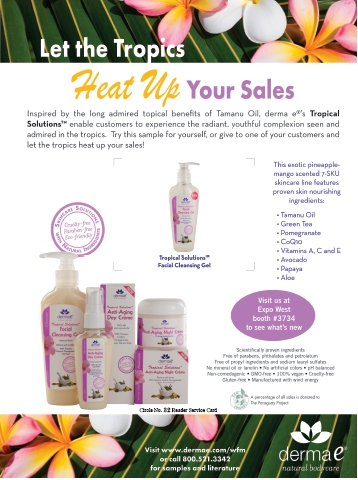 sensitive skin or suffer from inflammatory conditions such as rosacea should choose the natural ingredient Pycnogenol. This gentle, yet powerful antioxidant…contains anti-inflammatory properties to help stabilize the capillary system, improve circulation and increase the skin’s resistance to inflammation.”
sensitive skin or suffer from inflammatory conditions such as rosacea should choose the natural ingredient Pycnogenol. This gentle, yet powerful antioxidant…contains anti-inflammatory properties to help stabilize the capillary system, improve circulation and increase the skin’s resistance to inflammation.”
Some other helpful anti-inflammatory ingredients include vitamin A, vitamin E and green tea.
Stephen Strassler, president of Reviva Labs, Haddonfield, NJ, offers some information about rosacea and those that have spider veins. “It seems that few consumers know about vitamin P, which is rutin and citrus bioflavonoids and is part of the vitamin C complex,” he states. Though this unique skincare ingredient cannot cure rosacea, Strassler notes that the latter “has proven successful in diminishing spider veins, redness and rosacea.” According to information from Reviva Labs, “Although the total pathology of rosacea is not known, skin science does recognize that the capillaries are dilated, fragile and could be congested because such capillaries do not remove wastes and toxins effectively.”
Vitamin P may help strengthen capillaries and improve their elasticity, per information from Reviva. This effect will help declog congested capillaries and reduce their appearance. Plus, the stronger capillaries are, the less likely they are to become damaged again in the future.
Strassler says results are especially quick when topical formulas with these ingredients are combined with oral vitamin C supplements.
There’s been some interesting innovation in the market for irritated skin such as with seaweed. Adam Grossman, co-founder of The Seaweed Bath Co., LLC, Hallandale, FL, speaks of his personal experience: “I found that bathing in certain brown seaweeds reduced my psoriasis symptoms.” He states that seaweed is rich in vitamins, minerals and amino acids, “which nourish the skin and create a moisture barrier on the skin’s surface.” This may help anyone experiencing itchy, scaly, red skin to feel more comfortable—though it’s not a treatment for skin conditions like psoriasis.
Several observers, including Grossman, feel natural oils are good ingredients in topical products for sensitive, irritated skin. “We have seen really great results with [kukui oil, argan oil and neem oil],” he says. According to Grossman, kukui oil is a “potent natural moisturizer that is rich in oleic, linoleic and linolenic acids. Argan oil….is rich in vitamin E and essential fatty acids. Neem oil…contains emollients.”
But, experts also feel that some essential oils can irritate skin. Talk to shoppers about their individual needs before making broad suggestions about which products to try.
Other calming ingredients include:
• Aloe and Canadian Willowherb, which Miles says “helps calm irritations, nourish and moisturize sensitive skin, and reduce blotchiness, flare-ups and discomfort.”
• Evening primrose oil, rose flower extract, echinacea, calendula and chamomile flower extract, which have shown to be beneficial in some cases, says Pincu.
• Licorice root extract for soothing sensitive skin, says Tim Schaeffer, senior vice president of marketing for Mineral Fusion Natural Brands, Petaluma, CA.
• Kirsten Corcoran, founder and product manager of Larenim, Worthington, OH, feels “100% pure mineral makeup blends that use ingredients such as mica, titanium dioxide, zinc oxide and iron oxides have been demonstrated to have extremely low allergenic or sensitizing potential and are generally reported to feel soothing and non-aggravating to the skin. Additionally, these minerals will not clog the pores.”
 • Takahata says topical probiotics may be beneficial for those with eczema. He states, “There are many Staphylococcus aureus (that we identify as bad bacteria on the skin) present on skin with atopic or eczema conditions.” And, data indicate the fermented extract used in his firm’s skincare products “does not inhibit the growth of Staphylococcus epidermidis (that we identify as good bacteria on the skin); however, this fermented extract shows antibiotic properties against Staphylococcus aureus. Further, the effect of increasing the number of good bacteria on the skin is also expected because of the prebiotics’ effect, which the fermented extract possesses.”
• Takahata says topical probiotics may be beneficial for those with eczema. He states, “There are many Staphylococcus aureus (that we identify as bad bacteria on the skin) present on skin with atopic or eczema conditions.” And, data indicate the fermented extract used in his firm’s skincare products “does not inhibit the growth of Staphylococcus epidermidis (that we identify as good bacteria on the skin); however, this fermented extract shows antibiotic properties against Staphylococcus aureus. Further, the effect of increasing the number of good bacteria on the skin is also expected because of the prebiotics’ effect, which the fermented extract possesses.”
• Tea tree and oregano oil have “natural antibacterial, antifungal and antiseptic properties that can help combat a wide variety of skin problems such as bacterial and fungal issues, cuts, scrapes, blisters, rashes and dermatitis,” says Miles.
• Honey, tequilana blue green agave leaf extract and gotu kola stem cells all benefit sensitive skin, says Carey. For more on this last ingredient, see sidebar “Novel Skincare Ingredients.”
Remember, these products aren’t just about those with a diagnosed skin condition. A good chunk of your shoppers might be affected by sensitive skin, which Carey feels is a growing category. “Many people have sensitive skin and don’t know it,” she says.
And Billet adds, “Really clean and natural ingredients are best for all skin types.”
No matter which natural product a shopper is interested in, many experts recommend doing a patch test by applying a small amount to the skin to ensure irritation doesn’t occur.
Free and Clear
Consumers are increasingly seeking foods with claims like “gluten free” and “non-GMO.” There have been similar requests in the personal care arena and the natural skincare/makeup industry is responding.
“I have specifically witnessed the increased demand for ‘gluten free.’ The increased number of people being diagnosed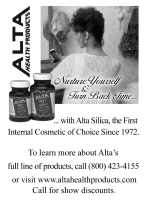 with celiac sprue in addition to the increased information circulating seems to have motivated people to look for makeup and skincare products that have this designation on their label,” says Corcoran.
with celiac sprue in addition to the increased information circulating seems to have motivated people to look for makeup and skincare products that have this designation on their label,” says Corcoran.
Adds Carey, “people with intense sensitivity to gluten will be helped by a gluten free skin care product as up to 60% of what you put on your skin is absorbed in.”
Several companies, like MyChelle and Larenim, say their products are gluten free. And, according to Saavedra, Hugo Naturals is the first major personal care brand to be certified by the Celiac Sprue Association. Saavedra says his firm uses other vegetable-derived ingredients like broccoli, mustard, rice, corn and coconut instead of wheat.
But unfortunately, not everything can be gluten free. Miles notes that all but two of her company’s products are gluten free. An important ingredient in these two items, Avena sativa (oat) kernel extract, plays a “critical role in the effectiveness of the formulas, helping to soothe itchy, irritated skin, but may contain traces of gluten depending upon the processing method used for the raw ingredient,” says Miles.
 Going GMO-free may be trickier for companies, says Schaeffer, because firms must be careful to find suppliers that carefully monitor the procurement of raw materials. Saavedra says his company requires all its suppliers to provide non-GMO documentation for ingredients.
Going GMO-free may be trickier for companies, says Schaeffer, because firms must be careful to find suppliers that carefully monitor the procurement of raw materials. Saavedra says his company requires all its suppliers to provide non-GMO documentation for ingredients.
Brigitte Rau, president of Brigit True Organics, Charlottesville, VA, also feels strongly about using only non-GMO, organically grown ingredients in her line “for the health of our customers and also to support organic farming and the health of our environment.” Rau notes that GMO crops spread quickly and can “encroach on neighboring conventional non-GMO and organic fields. Almost all corn and soy on this continent have been contaminated.” Thus, she feels by using non-GMO organic ingredients, her company is doing its part to save uncontaminated fields.
States Rau, “We recently changed the source of our vitamin E (an ingredient that cannot qualify for an organic status) from a soy to a sunflower base to make sure we do not accidentally get GMO contaminated and that we can continue to stay true to our goal of being as pure as possible.”
All Dolled Up
Mineral makeup has been steadily increasing in popularity over the past decade or so. Today’s mineral make-ups are quite different from the first- and second-generation formulas we saw years ago. Modern mineral makeup offers many of the improvements women are requiring of their cosmetics.
All-day color. For instance, busy women want products with staying power that won’t rub off or become “cakey” and “streaky” after a couple hours. Historically, there have been some limitations in this area for makers of mineral cosmetics.
“This has always been the formulation dilemma for us; sacrifice performance for green or vice versa,” says Michelle Doan, CEO of Emani Minerals, Norco, CA, “The last 12 years through trial and error, Emani has found a way to prolong natural makeup wear.” She says her company has a secret technique for eliminating cakey or streaky makeup that was developed after thoroughly researching skin function and the scope of the ingredient performance. She adds, “Once products are developed, they must pass a ‘makeup expert panel.’”
For foundation, Schaeffer feels the delivery method can make all the difference with makeup lasting throughout the day without any problems. He states, “We address [these issues] by specializing in the pressed base format, which applies smoother and silkier.”
Corcoran says that her company’s product formulators pay close attention to how the ingredients work with the skin. She states, “Using ingredients that do not trigger excess oil production or migrate into lines and pores but do lay well on top of the skin while smoothing out the pores will provide the best results.”
She also notes that the use of all-natural ingredients helps resist fading, too; synthetic products may be irritating, and cause their wearers to scratch or rub the product off. Corcoran adds, “Pure mineral makeup formulations will also generally resist sweating off as well, making them ideal for athletes or those in hot or humid climates. Some companies have a facial mist available which is applied over foundation to assist with setting their cosmetic products.”
But, according to Susanna Ronner and Nancy Caigan of Primitive Makeup, not all types of makeup can last 12–14 hours (like lipstick). In the conventional realm, “some extremely undesirable ingredients make it that way,” they say. The women suggest that one can make lip color last longer by first outlining lips, filling in with a lip pencil and then adding a coat of lipstick or lip gloss.
Brilliant hues. Beauty experts are predicting a trend toward bright and metallic colors in 2011. Many of today’s mineral make-up lines are ready to offer such choices. “This is our specialty—colors,” Doan states. “My philosophy has always been that women should not be limited to boring neutral colors just because the cosmetics they are buying are from a ‘green’ company.”
Her firm offers bright colors without dye by using mica and, through a proprietary process, layering it with iron oxide. “The easiest reference I can refer to is the rainbow and the spectrum of light filtered creating brilliant and vibrant colors,” Doan states.
Corcoran says her firm also uses some interesting techniques to make a wide spectrum of bright colors in the mineral makeup category. She states, “I use iron oxide blue, chromium oxide green, yellow oxide and ultra marine pink. With these colorants (coupled with mica), I can achieve an endless rainbow of cosmetic shades in any finish imaginable.”
Ronner and Caigan note that Primitive Makeup varies its color palette by season. “We have [everything from] neutrals, to mid tones, to wearable brights. We also have a beautiful gold metallic shimmer color, which can be worn alone or layered under or over any other lipstick, lip gloss or lip pencil,” they say.
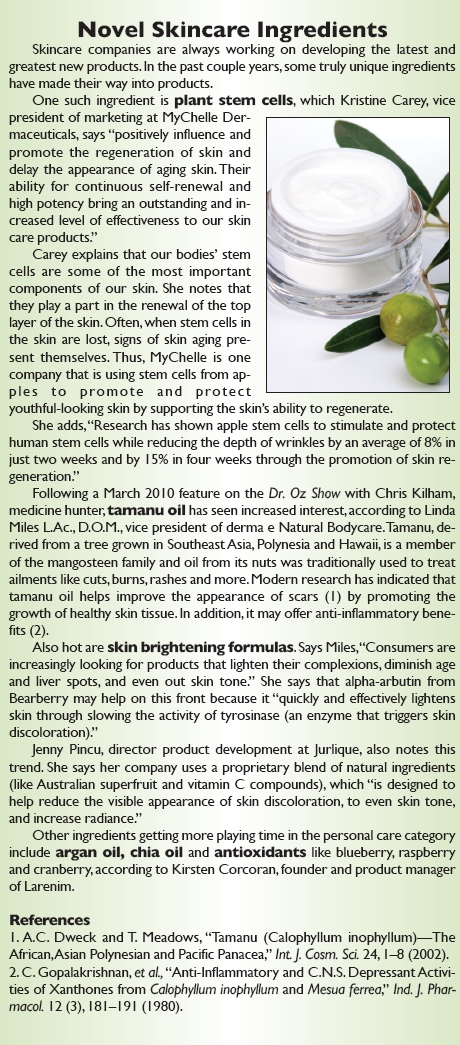 But Schaeffer reminds retailers that they should also offer neutral tones. He states, “We find our customer is more into a natural look and is not interested in fads or unnatural looks.”
But Schaeffer reminds retailers that they should also offer neutral tones. He states, “We find our customer is more into a natural look and is not interested in fads or unnatural looks.”
UV protection. Many shoppers are very concerned about protecting one’s skin from the sun. A look at a mineral makeup ingredient list may show some familiar ultraviolet (UV)-protecting ingredients like titanium dioxide and zinc oxide. According to Corcoran, these ingredients help offer some protection because they block or scatter UV rays, rather than absorbing them. But, be careful about recommending the use of mineral makeup as a sunscreen. Corcoran makes the point that a product’s effectiveness on this front is tied to how much of these ingredients are used, so not all products are the same.
Doan agrees, adding, “Many companies use less expensive fillers such as corn starch or silica, which will undermine the UV protection.”
Schaeffer raises another good point. Though some minerals in natural cosmetics are the same ones used in sunscreens and are great at protecting against the sun’s harmful rays, most makeup cannot legally state they offer UV protection. He states, “The only problem is in making an SPF claim because then there are FDA requirements in labeling and expiration dates.” But, he states that these same ingredients may state that they’re suitable for those with acne. “It’s more about the skin-friendliness rather than actually treating acne—minerals are typically much, much more skin friendly than conventional makeup,” Schaeffer says. WF
Reference
1. “Eczema,” WebMD, www.webmd.com/allergies/guide/eczema, accessed Jan. 18, 2011.
Published in WholeFoods Magazine, March 2011.


